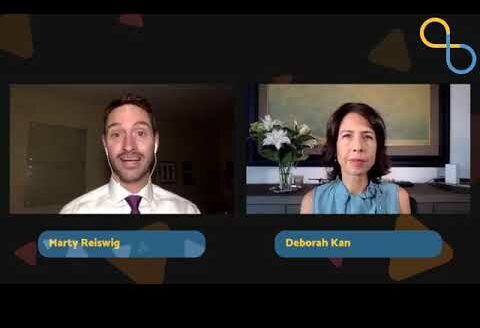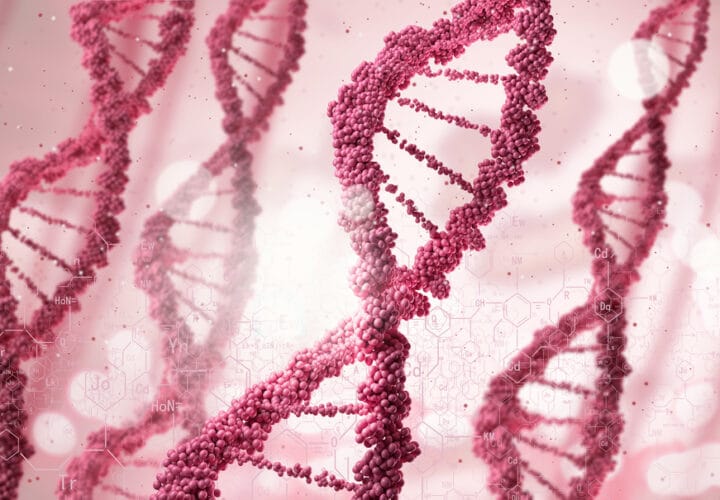Gene therapy for Alzheimer's patients may wipe out the gene associated with Alzheimer's and replace it with a protective version.
We know that Alzheimer’s is caused by a combination of genetics and environmental factors. But for some people, the chances of getting Alzheimer’s are much higher. People with two copies of the ApoE4 gene, a version of the ApoE gene involved in transporting cholesterol throughout the body, are up to 12 times as likely to get Alzheimer’s as people with the ApoE2 and ApoE3 versions of the gene. Once a person with two copies of ApoE4 turns 85, they have up to a 91 percent chance of developing Alzheimer’s.
People with two copies of the ApoE4 gene who found out their status through tests like 23andMe report depressive episodes brought on by the knowledge of their increased risk. “It was very, very shocking to me and I ended up going through a deep, dark phase of my life,” Jamie Tyrone, who carries two copies of ApoE4, told Being Patient.
How Gene Therapy Could Wipe Out Genetic Risk for Alzheimer’s
But what if scientists could change the course of genetics? Researchers at Weill Cornell Medicine in New York City are hoping that’s possible. They’re conducting a new clinical trial on people with two copies of the gene and mild to severe dementia to see how flooding the brain with ApoE2, a version of the gene shown to have a protective effect against Alzheimer’s, might help slow the disease.
This type “brain bath” gene replacement therapy has been used for conditions like brain tumors and degenerative brain diseases. Those therapies rely on a virus to send instructions to re-code DNA.
Starting this year, 15 people will get an injection of viruses carrying the ApoE2 gene. Only five percent of the population comes by ApoE2 naturally, but using it to try to convert ApoE4 genes to behave like ApoE2 genes might confer the 40 percent lower risk that comes with carrying an ApoE2 gene.
Scientists in the field admit that it’s a “long shot,” according to M.I.T. Technology Review, but without other treatments in sight and pharmaceutical companies calling off Alzheimer’s research regularly, it’s necessary to test all avenues for a cure.
“What attracts us to Alzheimer’s is that the genetic epidemiology is so obvious,” said Ronald Crystal, lead researcher, to M.I.T Technology Review. “So the strategy is, can we bathe the brain in E2? We have the infrastructure to do it, so we thought, why not? It gets around the problem of the mechanism of the disease.”
Still, ApoE4 does not appear to be the sole cause of Alzheimer’s—people with ApoE2 and ApoE3 get the disease, too. But testing the ability of ApoE2 to stop or prevent the disease does offer hope that we might one day treat Alzheimer’s before it begins. Recent trends in research suggest that Alzheimer’s is a disease that begins decades before symptoms like memory loss begin, suggesting a therapy to halt the conditions that cause Alzheimer’s would also need to be administered during this pre-symptomatic period.
Who Can Participate in Gene Therapy for Alzheimer’s?
The clinical trial is accepting 15 people over the age of 50 with mild to severe Alzheimer’s confirmed by PET scans and a significant presence of beta-amyloid, the protein that accumulates into plaques in people with Alzheimer’s. The study is funded by the Alzheimer’s Drug Discovery Foundation.
Because it’s a therapy that is meant to stop the disease before it starts, it’s unlikely that participants in the trial can expect a reversal of the disease. But it does open the door for alternative therapies that might one day help the genetically predisposed community.
For those who already know their genetic status, participating in research is the upside of knowing that you carry two copies of a potentially memory-robbing gene. “They say the first person who will be cured of Alzheimer’s disease is going to be a research participant,” said Tyrone, who is a research participant at Banner Alzheimer’s Institute, to Being Patient. “I’m hoping we will help the next generation not get Alzheimer’s.”




About a year ago, my mother was diagnosed with Alzheimer’s. It has been a difficult journey and we are hopeful we can find services to help improve or reduce her disease. Thank you for explaining to me that the ApoE gene has something to do with Alzheimer’s and having two of that gene increases your odds a lot! I wonder if we could find services that might be able to help my mother.
Alzheimer’s has affected my family as well. My grandfather died from Alzheimer’s when I was little so I never really got to know him. The last memory I have of him is him sitting in a hospital chair staring blankly at the wall, and I wanted to go in and see him but my mom said he probably wouldn’t recognize me. My grandmother later got dementia, and though I visited her occasionally, she didn’t seem to know who I was most of the time. I didn’t really get to know her either before she died a couple years ago. I’m 21 now and I just found out that I have one copy of the APOE4 allele through 23andme, and I was pretty shocked. The thought of the same thing happening to me is terrifying, and it’s depressing how little progress we’ve made with all the billions put into Alzheimer’s research, but if they’re able to successfully use gene therapy to replace the APOE4 gene with APOE2, perhaps I’ll be spared the same fate and Alzheimer’s won’t burden as many families as it does now.